

3 approches différentes des social media analytics. J’ai déjà eu l’occasion de vous parler de social scoring et des indicateurs-clés des médias sociaux que l’IAB tente de standardiser.
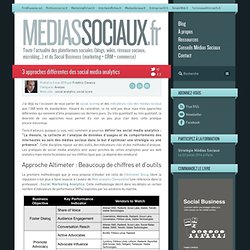
Hasard du calendrier, ce ne sont pas deux mais trois approches différentes qui viennent d’être proposées ces derniers jours. Du très quantitatif au très qualitatif, la diversité de ces approches nous permet d’y voir un peu plus clair dans cette pratique encore méconnue. Tiens d’ailleurs, puisque j’y suis, voici comment je pourrais définir les social media analytics : “La mesure, la collecte et l’analyse de données d’usages et de comportements des internautes au sein des médias sociaux dans le but d’optimiser une stratégie ou une présence”. Cette discipline repose sur des outils, des indicateurs-clés et des méthodes d’analyse.
Les pratiques de social media analytics sont assez proches de celles employées pour les web analytics mais moins focalisées sur les chiffres (quoi que, ça dépend des vendeurs). 5 Differences Between Social Media and Social Networking. The differences between social media and social networking are just about as vast as night and day. There are some key differences and knowing what they are can help you gain a better understanding on how to leverage them for your brand and business. 1. By Any Definition Social media is a way to transmit, or share information with a broad audience. Everyone has the opportunity to create and distribute. On the other hand, social networking is an act of engagement. 2. The 5 Qualities of Highly Effective Community Managers. Erin Bury is the community manager at Sprouter.com, an expert Q&A site for startup founders around the world.

You can follow her on Twitter @ErinBury and read her blog at ErinBury.com. Less than three years ago, community managers were a rare group of employees most often found at technology startups. Today, the role of community manager is common at companies of all sizes — from startups to multinational corporations. Despite their ubiquity, there is still a lot of confusion around what a community manager actually does and what employers should look for when hiring one.
Performable founder David Cancel recently wrote about the traits he looks for in potential startup hires. Don’t lose existing members of your online community. New members help your community become more vibrant – but you don’t have a community in the first place if you can’t keep hold of your existing members.
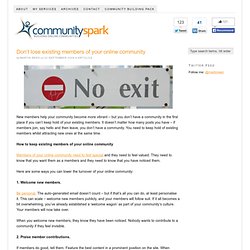
It doesn’t matter how many posts you have – if members join, say hello and then leave, you don’t have a community. You need to keep hold of existing members whilst attracting new ones at the same time. Here’s why you’re not a community manager « Online Community Str. If you follow me on Twitter you know that I spent most of the day at the Social Media Business Forum .
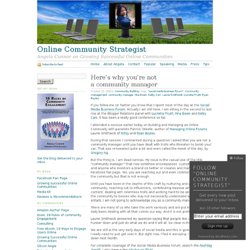
Actually I am still here. I am sitting in the second to last row at the Blogger Relations panel with Lucretia Pruitt , Ilina Ewen and Kelby Carr . It has been a really good conference so far. I attended a session earlier today on Building and Managing an Online Community with panelists Patrick OKeefe, author of Managing Online Forums Laurie Smithwick of Kirtsy and Ryan Boyles . How to build and maintain trust in online communities. A vital element of a successful online community is trust.
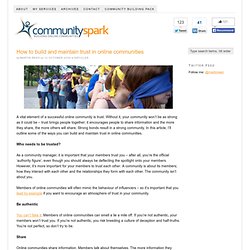
Without it, your community won’t be as strong as it could be – trust brings people together; it encourages people to share information and the more they share, the more others will share. Strong bonds result in a strong community. In this article, I’ll outline some of the ways you can build and maintain trust in online communities. How to deal with bad apples in your online community. No online community is perfect – there will come a time (if it hasn’t happened already) when a member becomes abusive or confrontational.
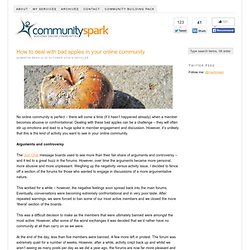
Dealing with these bad apples can be a challenge – they will often stir up emotions and lead to a huge spike in member engagement and discussion. However, it’s unlikely that this is the kind of activity you want to see in your online community. Arguments and controversy The Just Chat message boards used to see more than their fair share of arguments and controversy – and it led to a great buzz in the forums.
However, over time the arguments became more personal, more abusive and more unpleasant. This worked for a while – however, the negative feelings soon spread back into the main forums. This was a difficult decision to make as the members that were ultimately banned were amongst the most active. At the end of the day, less than five members were banned. The importance of (some) rules Keep your rules short, basic and to the point. Trolls. Inside the mind of an online community lurker. You shouldn’t judge your community by the number of members it has – one of the reasons why is because typically, only a fraction of those members will actually be active contributors.
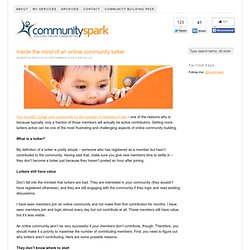
Getting more lurkers active can be one of the most frustrating and challenging aspects of online community building. What is a lurker? My definition of a lurker is pretty simple – someone who has registered as a member but hasn’t contributed to the community. What makes social-media followers flee? This post is written by Mirna Bard, a blogger, speaker and consultant.

She serves as the social-media chairwoman of the Orange County (Calif.) chapter of the National Association of Women Business Owners, and she teaches social media at the University of California at Irvine. SmartPulse — our weekly reader poll in SmartBrief on Social Media — tracks feedback from leading marketers about social-media practices and issues.